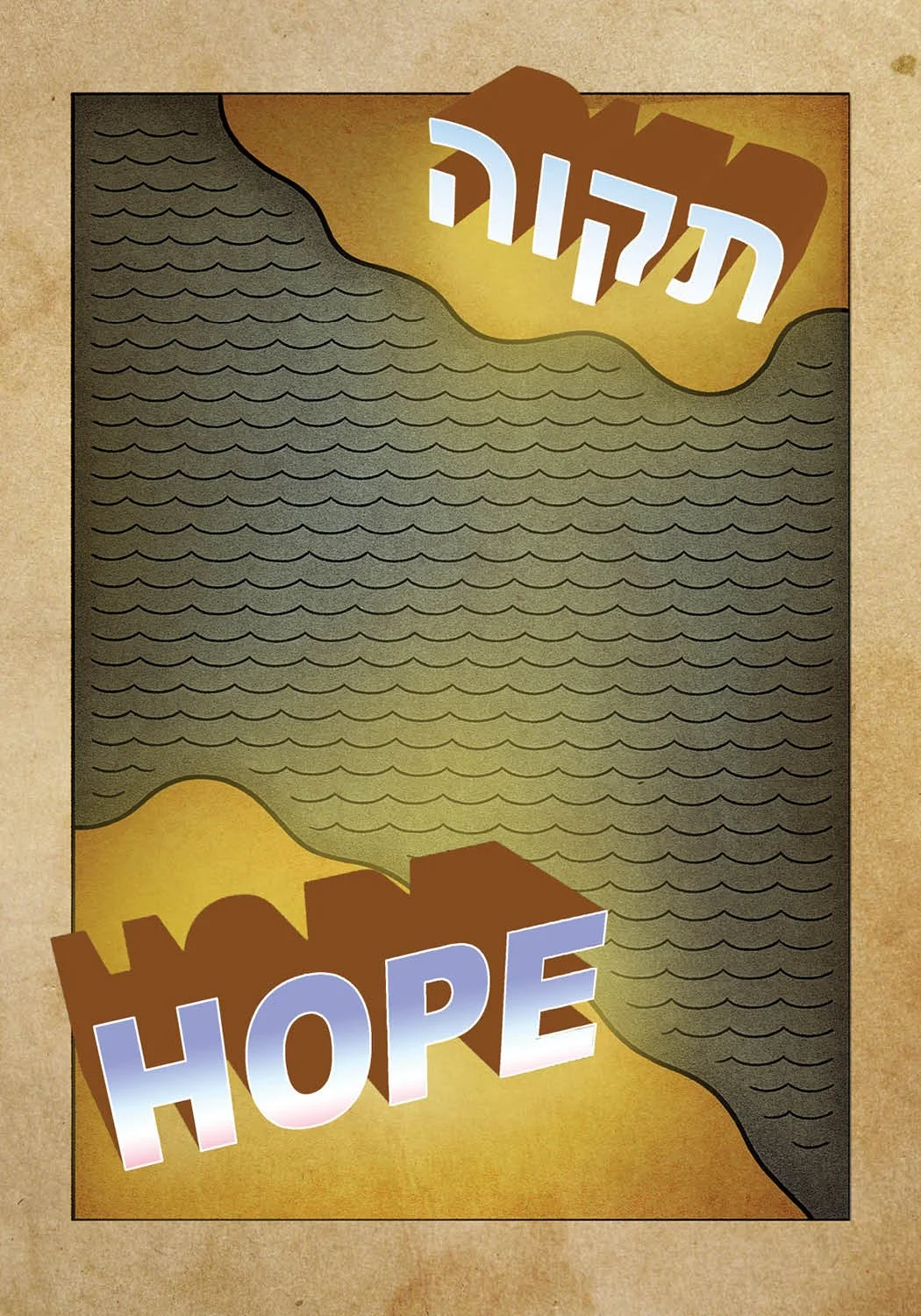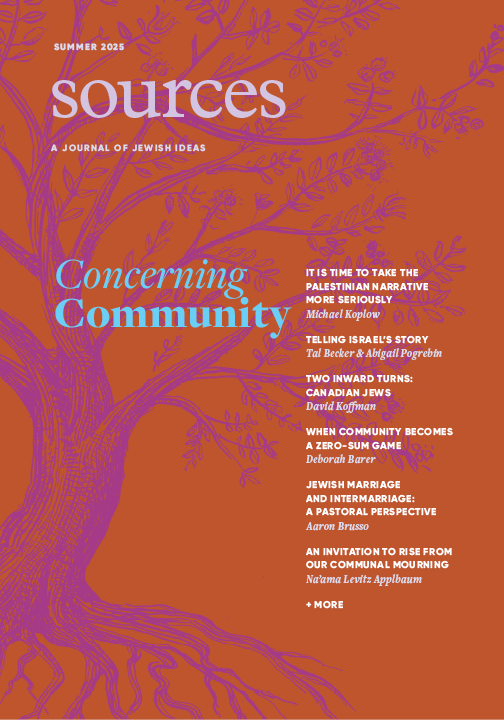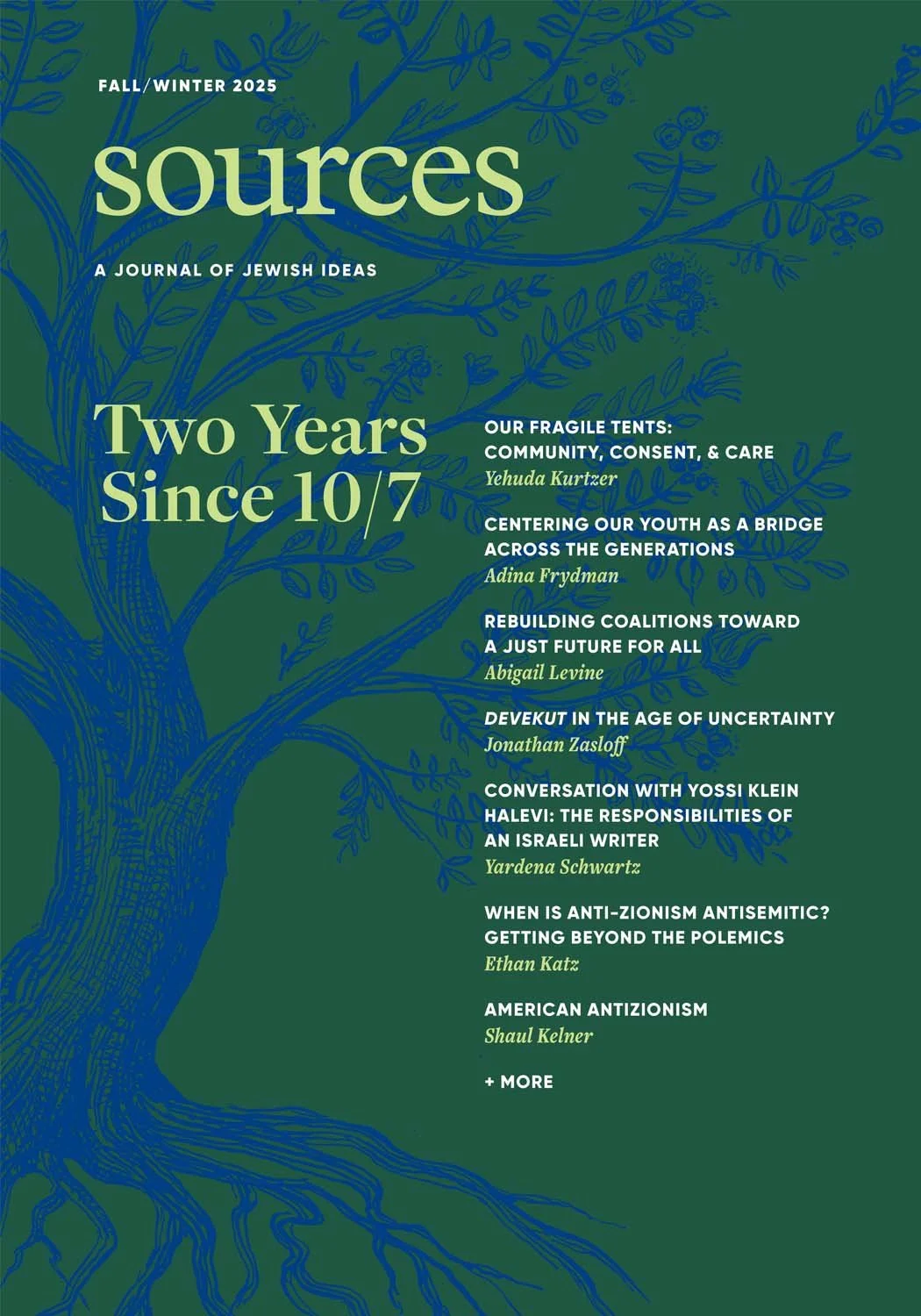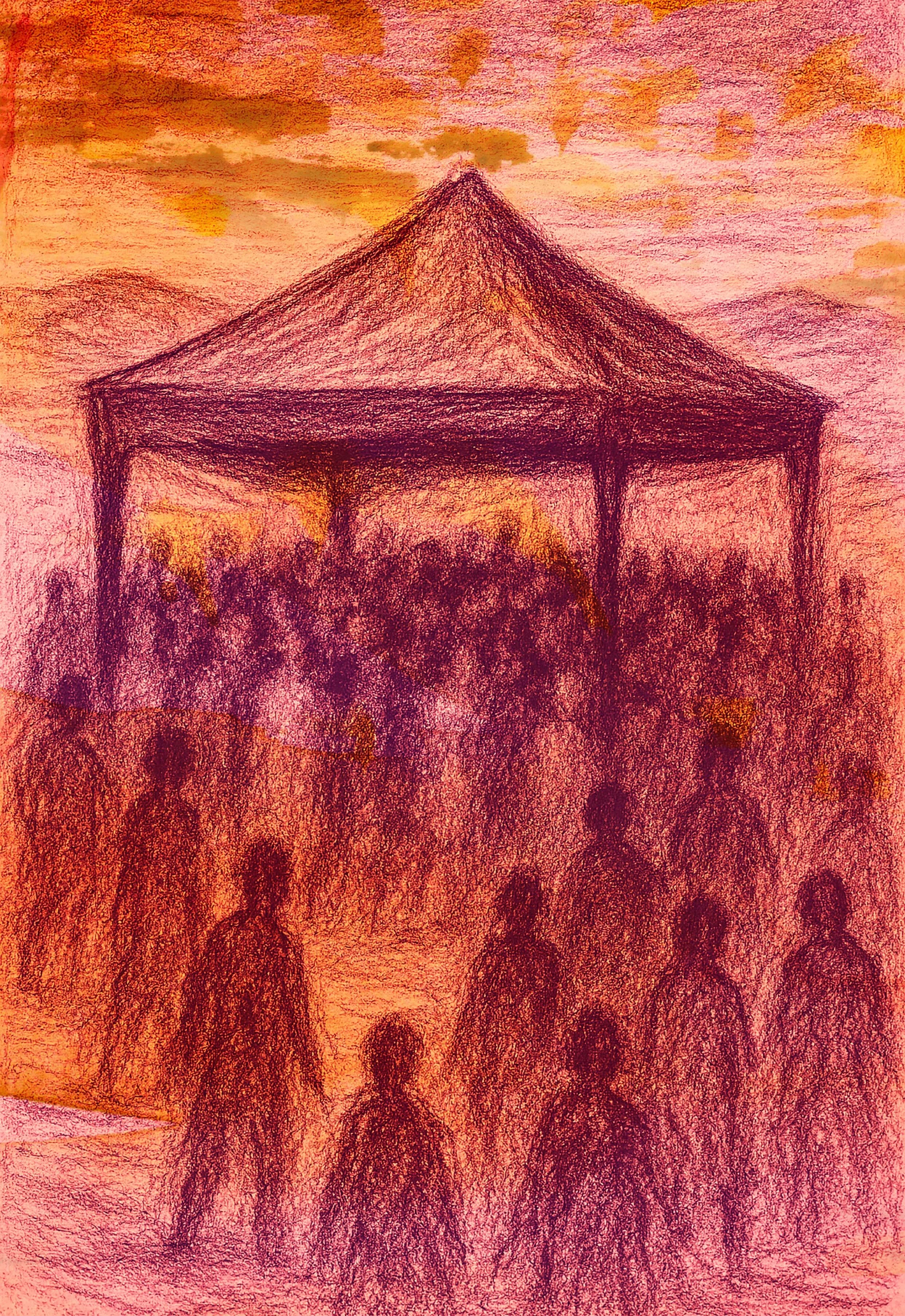Hope Across the Atlantic
Masua Sagiv
Translated by Levi MorrowMasua Sagiv is Senior Faculty at the Shalom Hartman Institute and the outgoing Koret Visiting Assistant Professor of Jewish and Israel Studies at the Helen Diller Institute, University of California, Berkeley.
Levi Morrow is a teacher, writer, and translator living in Jerusalem, where he is a PhD candidate in the Jewish philosophy department at the Hebrew University. He is a research fellow at both the Franz Rosenzweig Minerva Research Center and the Shalom Hartman Institute.
An earlier version of this essay appeared in Hebrew in Ofakim (Fall 2024).
In my first year living in Berkeley, California, I came across a post on Twitter (now X) that has stayed with me for the past four years. Loosely translated from Hebrew, it said, “Once you’ve crossed the ocean, you’ll never stop longing for what’s on the other side.” Over the last four years, I’ve been lucky to belong to and work within a vibrant Jewish community in North America, just as I did in Israel. Moving from one place to the other, settling in Berkeley all the while knowing I’d eventually return to Jerusalem, has left me feeling at home and yet not entirely at home in both places. In this piece, I want to reflect on hope from a perspective that is both internal and external to the two largest Jewish communities in the world: those in Israel and America. I’ll focus on sociohistorical differences between American Jews and Israeli Jews and how they affect the way these two communities relate to hope, and what they can learn from one another.
Breaking Jewish History
During my first few months in America, I noticed a recurring theme in every prep conversation I had before meeting with a Jewish community: no matter the topic or the audience, I was always asked to end with “something hopeful.” As a somewhat cynical Israeli, my initial reaction (which I kept to myself—I might be an Israeli, but I am also polite) was to roll my eyes and critique what I saw as a naive need for positivity and happy endings, even when reality didn’t provide them. “You need to face reality,” I would think, “not just sugarcoat things for the audience.” But intense crises in Israel—first over the judicial reform proposals in 2023, and then the events of October 7, the ensuing wars in Gaza and Lebanon, the plight of the hostages, and the brief period of direct war with Iran—completely transformed my perspective on the role and importance of hope, as an essential, driving force in both the personal and public spheres.
For Jews in both the US and Israel, hope has been central to an ethos of breaking the cycle of Jewish history. For American Jews, hope is a part of breaking free from a history in which Jewish life in diaspora is necessarily a life of victimhood. The idea of American Exceptionalism reflects the widely held belief that America is different from any other place Jews have lived throughout history. Here, Jews can thrive and belong as individuals and as a community. For Israeli Jews, or for the Zionist project, hope is an ambition paired with a political plan: breaking the historical cycle of Jewish victimhood with Jewish sovereignty and the creation of an exemplary society—both Jewish and democratic—within the State of Israel.
Neither of these ideas is entirely new in Jewish history. America isn’t the first place where Jews believed they had transcended antisemitism and integrated successfully into society; similar hopes emerged in Western and Central Europe during the process of political emancipation in the 18th and 19th centuries. Nor is Israel the first sovereign Jewish project. The differences are that until America and until Israel, such attempts did not last very long.
In the past three quarters of a century, the success of these two ideas of a home for the Jewish people—one in diaspora and one in the land of Israel—have strengthened each other.
But the events of October 7 and its aftermath shook both the American and Israeli narratives of home at their core, suggesting that perhaps neither Zionism nor the American Jewish project has truly broken the historical pattern of Jewish victimhood. Jews in both communities are now wrestling with a deeply unsettling question: Were the past 77 years the start of a new chapter in Jewish history, or just a brief interlude in an ongoing Jewish story—a story which Rabbi Joseph Soloveitchik defined, in Kol Dodi Dofek (1956), as one of shared suffering? The result is that over the past 22 months, much more than in recent decades, we have been preoccupied with our physical safety and security as Jews.
My colleague, Yehuda Kurtzer, President of the Shalom Hartman Institute, has identified two approaches to the question of what ensures Jews’ security. The first approach sees Jewish integration into the liberal project in America as the key. Blind to the particularities of individual identities, liberalism champions fundamental equality and autonomy for all as the essence of freedom. This ideology promised—and provided—American Jews something novel in Jewish history: partnership and security. In return, American Jews supported the liberal project, both out of a particularistic, even survivalist, logic—if all minorities are safe, so are Jews—and out of universalistic ideals: Jews could, perhaps for the first time, participate in a national project for the greater good of all citizens.
The second approach, as Kurtzer explains, emphasizes that only Jews can ensure their own safety. Advocates of this view, shaped by the traumas of antisemitism, persecution, and failed attempts at integration throughout Jewish history, distrust political theories (including liberalism) that make Jewish security dependent on others. According to this approach, the biblical notion of a “people that dwells alone” (Num. 23:9) is not only a description of reality but also a manual on how to operate within it. This perspective was central to Zionism and its call for Jewish sovereignty. Today, this approach is, of course, embodied by the State of Israel.
At first glance, you might say that the first approach is rooted in hope, while the second is grounded in suspicion. The American Jewish story is outward looking and full of hope—toward the state, toward non-Jews as allies and partners, and toward the liberal project itself. It is no surprise, then, as Rachel Jacoby Rosenfield, CEO of the Shalom Hartman Institute of North America, points out, that hundreds of American synagogues include “hope” in their names: Shaarei Tikvah (Gates of Hope), Beit Tikvah (House of Hope), Kehillat Tikvah (Community of Hope), and more.
In contrast, the Israeli Jewish story is inward looking and steeped in a deeply ingrained suspicion—some might call it pragmatism—toward the nations of the world. On this account, Jews must take their destiny into their own hands because they cannot trust the world to protect them. Israel’s political independence, set in the dangerous neighborhood of the Middle East, has brought with it wars, loss, and pain. Israel has also continuously struggled to live up to the Zionist vision of a Jewish and democratic state—particularly in regard to the questions of how a Jewish state should exercise power, and how Israel should balance its Jewish identity with liberal and democratic values.
Faced with political, social, and security crises since the 1990s, after the assassination of Prime Minister Yitzhak Rabin and the failure of the Oslo Accords, and especially over the past decade, liberal Jews in Israel—those who hoped and worked for Jewish sovereignty and an exemplary society—have built defensive walls around themselves. If you are less hopeful, or if you temper your hope with a sizeable dose of cynicism, the sting of disappointment hurts less when the blows come—and the blows have come over and over again.
The Israeli ethos of hope as a political project assumes that we can actively change our reality and make it better. But over the last two years, the lack of accountability, the continuous failures of the national leadership, and the severe divides within Israeli society have left many Israelis feeling that even speaking of hope risks sounding insensitive and mocking. Israelis have watched event after event that, in any other era, would have sparked significant political change. Yet in today’s Israel, the political sphere feels stuck. Many Israelis feel a sense of futility—that no matter what they do, nothing will change. The resulting despair about our ability to change the political situation is a fatal blow to the Israeli ethos of hope.
Beyond Suspicion, Beyond Hope
Yet suspicion, disappointment, and cynicism aren’t the whole story. Despite recent challenges and blows, the Israeli Jewish story is still very much rooted in hope. In the book of Exodus, when the Israelites crossed the Red Sea and realized their time in Egypt was over, they burst into song. After that song—the Song of the Sea—the Bible describes another moment: “Miriam the prophet, Aaron’s sister, picked up a tambourine, and all the women went out after her in dance with tambourines” (Ex. 15:20).
The Israelites had left Egypt in haste, so much so that they couldn’t wait for their bread to rise. Yet the women still made time to pack their musical instruments. Different commentators, trying to understand the choice to bring tambourines, explain that these righteous women believed with certainty that God would perform a miracle for them. In a deep way, the women who went out of Egypt, despite the intense pressure to leave and the fear of what might await them along the way, believed that the day would come when they’d sing and dance. Reading these commentaries now, I can’t help but think of the Nova Festival survivors and the promise many of them have made: “We will dance again.” This community, having endured an unimaginable massacre and still grappling with profound trauma, carries their music with them nonetheless, just as the women of the Exodus did, with the conviction that brighter days lie ahead.
Hope exists at the intersection of dreams and action. One year after October 7, in the commemoration ceremony organized by the bereaved and hostage families, Yonatan Shamriz, brother of Alon Shamriz, one of three hostages who managed to escape their captors in Gaza but were tragically accidentally killed by the IDF, finished his speech with these words: “We will not let go until we repair, we will not rest until we rebuild. We are the generation that will emerge from the ruins, from the Holocaust, from the inferno and fulfill the new Zionist vision... Rise up! Am Yisrael chai!"
Every day, hundreds of thousands of Israelis act to bring about a better tomorrow. Whether it is the overwhelming mobilization of people meeting the needs of evacuees, survivors, injured soldiers, hostage families, and reservist families; or communities in the south rebuilding in the wake of October 7; or countless new grassroots civic and political initiatives, Israeli life is marked not only by despair and suspicion but also by hope.
That hope has been nurtured most recently, for many, by a renewed sense of national agency following the swift and effective military response to threats from Hezbollah and Iran. The knowledge that even amid deep internal divides, Israel was able to creatively and powerfully push back against those who are determined to destroy it was, for the majority of Israelis, a source of pride. It did not erase the country’s societal fractures or solve its leadership failures, but it reminded Israelis of our capacity to act and to prevail.
And just as the Israeli Jewish story isn’t only a story of suspicion and despair, the American Jewish story isn’t only a story of hope. Today, American Jews are grappling with a deep rupture in the ethos of American Exceptionalism. After October 7, many American Jews saw that allies on whom they once relied have disappeared or even turned against them in their moment of crisis. Rising antisemitism, including shocking violent incidents and biased media coverage, led many American Jews to question whether they had truly managed to break free from the historical cycle of Jewish vulnerability. Many are realizing that for Jews today, the inclusion and membership that the liberal order promised comes at the price of denouncing an integral part of their Jewish identity: their commitment to Zionism and the State of Israel.
But, to be honest, I have found many American Jews doubting the claims of American Exceptionalism for a long time. On January 2023, months before our world fell apart, I was in New York and had an evening off. Several colleagues recommended I go to a hit Broadway show, Leopoldstadt. In my somewhat provincial sense of what Broadway theater is, I was certain that a hit show must be an uplifting musical, and so I happily went with a friend without pausing to read what the play was about. Upon arriving, I quickly realized that Leopoldstadt is actually a tragic play about the Holocaust, telling the story of an Austrian Jewish family from the beginning of the 20th century until a decade after the Holocaust.
Ultimately, what surprised me most about Leopoldstadt was the show’s popularity with American Jewish audiences. In the show’s final scene, the family’s three surviving members gather in Vienna: Rosa and Leo who escaped before the Holocaust to the US and to Britain, respectively, and Nathan who survived Auschwitz and returned to live in the family’s home. When Leo tries to understand Nathan’s decision to return to Vienna and his plan to stay there, Nathan responds in defiance. He reminds Leo and the audience that Vienna is his town, referencing the important role of Jews in Vienna. But he ends his explanation with bitter resignation, adding dryly: “Anti-Semitism is a political fact. It’s a bit soon for it to be a party platform, but when it is, there’ll be Austrians who vote for it.” This message is a version of an idea very familiar to me as an Israeli: it's only a matter of time until antisemitism explodes again. But I didn’t expect to encounter it in America.
And yet, in conversations following the show, a colleague told me—only half-jokingly—that she knows exactly which non-Jewish friends would hide her if it should become necessary. Another friend said he knows exactly where the suitcases are stored and what they will take with them should he and his family ever need to leave in a hurry. This sense of unease was captured powerfully in Nathan Englander’s 2012 short story “What We Talk About When We Talk About Anne Frank” which revolves around a Jewish couple living in a luxurious house in Florida. The wife, Deb, plays a game that isn’t really a game—her partner considers it an active pathology—wherein she and a conversation partner discuss which of their non-Jewish acquaintances would hide them and their families during a new Holocaust—and who would turn them in.
Whatever vague form their fears might have taken in the past, over the last 22 months, American Jews have come to recognize that they need to be more publicly and intentionally critical and cautious about their story of integration into American society. In March of last year, journalist Franklin Foer published an essay in The Atlantic, which served as both a warning and a lament for what may be the end of the Golden Age of American Jewry. He gave voice to what many had been formerly whispering: that the sense of belonging that American Jews take for granted may not hold. What was once a private fear had become a public conversation.
After antisemitic incidents at the Democratic National Convention in August, Abe Foxman—a Holocaust survivor and former National Director of the Anti-Defamation League—posted on X that while he believes the future for Jews in America will be better than the present, he doubts it will ever return to what it was before October 7.
Still, American Jews are not giving up on their society or on hope, which remain central to their lives. Despite the bitter disappointment and deep fear, they continue to build alliances, drawing hope from a surge in Jewish engagement in American Jewish institutions—from Hillel and Chabad on college campuses to a record number of conversions in liberal communities and increased activism for interests of the Jewish community. Indeed, American Jews are not giving up on hope, but their frustration and suspicion are increasingly visible alongside it.
Living Up to the Anthem
Overall, it seems to me that the two communities hold onto both hope and suspicion (verging on despair over the last 22 months), albeit in different ways. The differing realities of life in Israel and life in America have led each community to develop unique relationships between these two forces and unique ways of realizing them in practice. American Jews tend to hide their suspicions behind walls and wear their hope “on their sleeves,” while Israeli Jews often hide their hope behind walls and keep suspicion close, as a protective shield.
As an Israeli living in America for the past four years, I think Israelis could benefit from making the opposite journey—giving hope a bit more room, without constantly raising our defenses. Hope is belief in the possibility of a better future and in the actions that will help bring it about. Israeli history is full of examples of resilience and rebuilding after crises, and its present offers nothing less. For many, Israel’s initiative in Iran felt like more than just a military success. It was a flash of something October 7 threatened to extinguish: a collective sense that we are still capable of shaping our future, not only enduring it.
Our forward-looking, action-oriented nature offers a strong foundation for hope. Indeed, Israelis are constantly working toward a better future, but as a defense mechanism against the pain of disappointment, we avoid talking about hope. After so many failures, we avoid vulnerability, mocking the “naiveté” of those who dare to hope.
Wearing our hope on our sleeves—regularly putting it on display—can be scary, but it is critical. Silencing hope risks letting despair become routine, letting it become the norm. The Zionist project was once seen as an impossible political dream, but it succeeded against all odds thanks to actions grounded in an ethos of hope. Giving up on the belief in achieving a better world through social and political change would mean giving up on the Zionist and Israeli project entirely.
“You do realize, don’t you,” someone asked me at a lecture this past year, “that your national anthem is literally titled Hatikvah, ‘The Hope’?” Over the past two years, through the protest movement and in the wake of October 7, I think I have sung “Hatikvah” more times than I ever had before. The time has come for us Israelis to be courageous—not only in our actions, but also in embracing the hope that inspires them.
And for American Jews, for whom hope has long been a public language, it is not only legitimate, but seemingly necessary and prudent, to give suspicion some room alongside hope. Doing so does not betray the ethos of hope at the heart of American Jewish identity but rather responds to a sharp and undeniable shift in reality. Living deeply in both communities, I’ve come to see that what we tend to suppress in public is often what we most need to say out loud.




